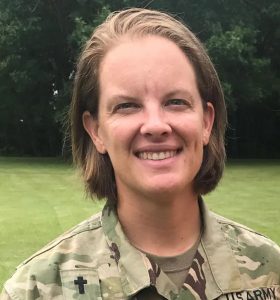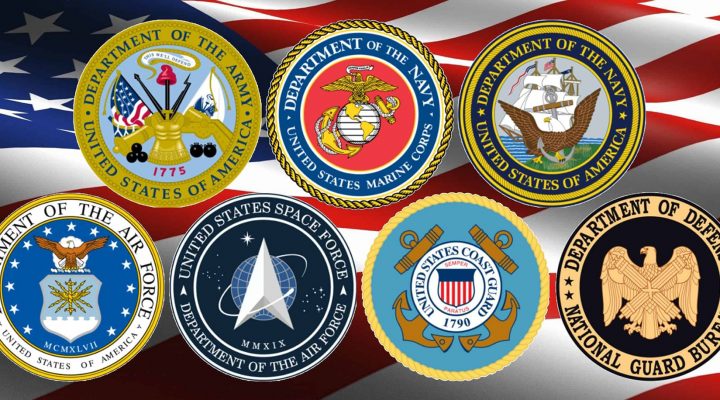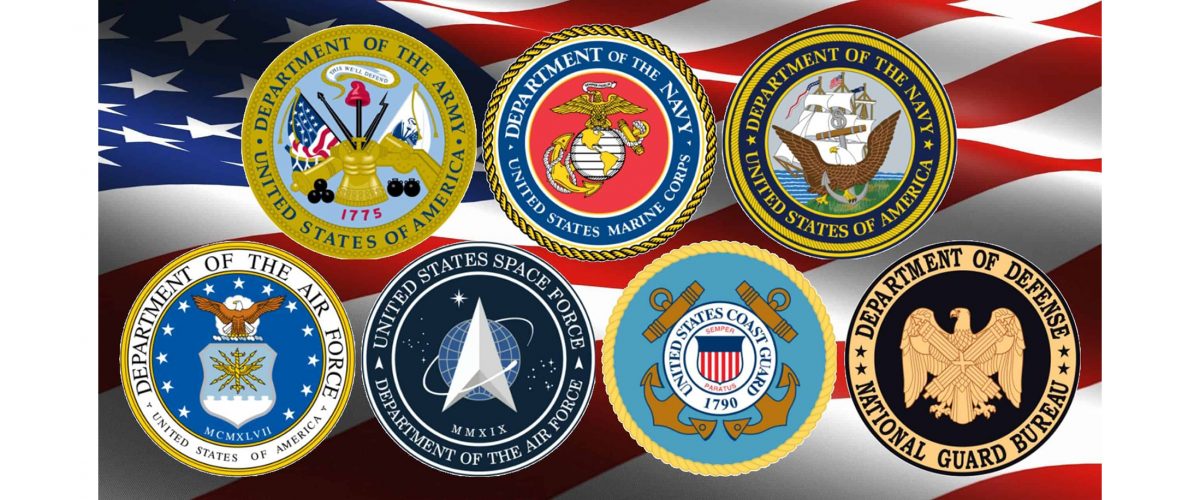The ranks of U.S. military chaplains do not reflect the diversity of race, religion, gender and sexual orientation of the service members they serve, National Guard chaplain Megan Joyner said during an online workshop hosted by the Alliance of Baptists.
“That means a majority of the service members have not met a diverse chaplain, they haven’t met a non-Christian chaplain, many of them have never encountered or engaged with the female chaplain and quite a few never have been engaged or led by chaplains of color.”
Joyner serves with the District of Columbia Army National Guard and in 2016 became the first openly gay person — and only the second woman — to serve as a chaplain in the North Carolina Army National Guard. Her military chaplaincy is endorsed by the Alliance.

National Guard chaplain Megan Joyner
Joyner was the featured guest during a June installment of the “Continuing the Conversation” webinar. She addressed the influence of evangelical, nationalistic Christianity in military chaplaincy and how the Alliance can help bring a more grace-oriented theology to the uniformed services.
She opened the presentation with a slide showing the Army National Guard chaplain corps is comprised of 16 non-Christians (2.4% of the total), 42 females (6.2%), 115 people of color (17%) and 16 females of color (2.4%).
“Another thing that’s worth noting is there are no stats on LGBTQ chaplains. We exist. We’re out there. But when you get into LGBTQ diversity among service members who may be within those communities, there is even less representation and less visibility,” she said. “So, we’re really hurting across the board when it comes to chaplains who can serve and represent the diversity within our midst.”
Also unrepresented are non-Christian chaplains and those who are progressive or moderate Christians, which has contributed to the dominance of conservative evangelicals among military chaplains and a corresponding narrative that they represent the faith of true patriotism, she said.
“The truth is service members aren’t just all conservative.”
“We have allowed that stereotype to come to the forefront because the truth is service members aren’t just all conservative, they are not just all blind patriots. They are really, really diverse and the chaplain corps does not currently represent that diversity at all.”
Joyner said the Alliance can lean further into its social and racial justice mission by expanding outreach and ministry to the military by recognizing potential military members within its ranks, by empowering current military chaplains, interacting with local military installations and by publishing a guide for Alliance-endorsed chaplains.
“There’s an opening where we can continue our fight against this evangelical, nationalistic Christianity that’s made its way to the forefront lately, and I think there’s a way we can continue that work within military chaplaincy,” she said.
The Alliance’s approach to grace-filled faith is desperately needed by National Guard members mostly exposed to preaching and devotionals focused on sinfulness and wrath, Joyner said. “I always left those devotionals feeling a little annoyed, upset, depressed. It certainly didn’t build me up. But when I’ve gone to Alliance congregations, when I’ve been in conversations about my own chaplain service within the Alliance, it’s very much focused on grace, affirmation and love.”
An increase in Alliance-endorsed chaplains is needed to meet the current generation of young soldiers who more and more identify as spiritual but not religious, religiously unaffiliated or religiously nontraditional, Joyner reported.
“One of the things I can always say about the Alliance is that we engage in those conversations. The churches and religious bodies that make up the Alliance are so diverse that their worship services often look different. So, we understand what it means to think outside of the box, which a lot of this younger generation is doing when it comes to spirituality.”
The Alliance is one of an array of Baptist bodies that “endorse” chaplains for military service. All branches of the military require chaplains to be endorsed by an approved body. The Southern Baptist Convention continues to provide the largest number of Protestant chaplains in the military.
Other Baptist groups that endorse chaplains include the Alliance, American Baptist Churches (USA), the Cooperative Baptist Fellowship, the Progressive National Baptist Convention, the National Baptist Convention of America Inc., the National Baptist Convention USA Inc., and a host of smaller denominations.
According to one 2017 study, evangelical Christians account for 69% of all military chaplains, while only 13% of military members identify as evangelical Christians. This disparity is not so much due to a bias among military leaders but is the result of evangelical Christians being more likely to train and sign up for chaplaincy service.


